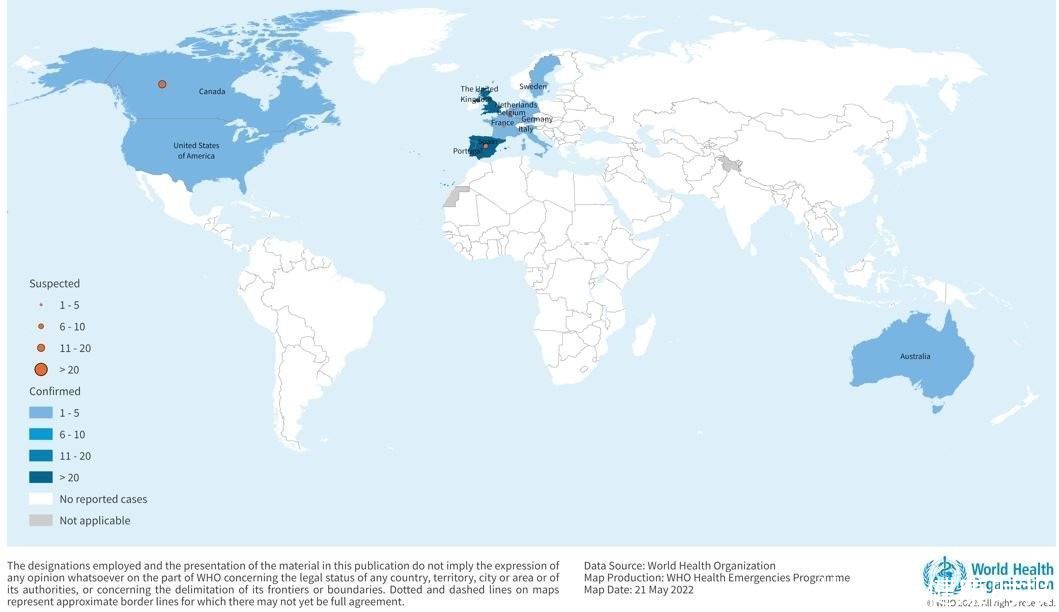At 13:00 on May 21, Swiss time, the World Health Organization published “Many non-endemic countries report monkeypox outbreaks” mentioned that from May 13 to 21, 12 monkeypox non-endemic countries have 92 confirmed cases of monkeypox and 28 suspected cases were reported. WHO predicts that global monkeypox cases may increase further.
According to WHO, monkeypox endemic countries are Benin, Cameroon, Central African Republic, Democratic Republic of Congo, Gabon, Ghana (found only in animals), Côte d’Ivoire, Liberia, Nigeria, Republic of Congo, Sierra Leone, and South Sudan. From December 15, 2021 to May 1, 2022, the Democratic Republic of Congo has reported 1,238 confirmed cases of monkeypox and 57 deaths.
According to WHO, non-endemic countries that have reported monkeypox infection include Australia, Belgium, Canada, France, Germany, Italy, the Netherlands, Portugal, Spain, Sweden, the United Kingdom, and the United States; among them, More than 20 confirmed cases have been reported in Portugal, Spain and the UK. In addition, as of press time, Switzerland and Israel have also reported the first cases of monkeypox in their countries.

From May 13 to 21, 2022 at 13:00, the geographic distribution of confirmed and suspected cases reported in monkeypox non-endemic areas. The WHO map
is unusual! There is no clear travel link between the case and the endemic area
Epidemiological investigation is still in progress, but there is no clear travel link with the monkeypox endemic area in the currently reported cases, and the cases are mainly in primary Found among men who have sex with men seeking care in health and sexual health clinics.
WHO says it is unusual that these current cases have no direct travel link to areas endemic for monkeypox. Monkeypox virus is still circulating, and monkeypox surveillance in non-endemic areas has previously been limited; more cases are expected in the near future as more countries begin monitoring monkeypox outbreaks.
WHO calls for accurate disease information to be provided immediately to susceptible populations to prevent further spread of the virus. Available information indicates that close physical contact with a person infected with the monkeypox virus who has developed clear symptoms is a high-risk group in which human-to-human transmission of the monkeypox virus is taking place.
The mortality rate is lower, and the detected monkeypox virus is the West African clade
The currently obtained case samples are confirmed to be infected by the monkeypox virus West Africa through PCR detection clade. The genome sequence of a swab sample from a confirmed case in Portugal shows that the monkeypox virus responsible for the current outbreak is very similar to that exported from Nigeria to the UK, Israel and Singapore in 2018 and 2019.
Monkeypox is a viral zoonotic disease with symptoms very similar to those seen in past smallpox patients. Currently, monkeypox viruses have two clades: the West African clade and the Congo Basin (Central Africa) clade. Compared with the Congo Basin clade, the fatality rate of humans infected with the West African clade was 3.6%, compared with 10.6% in the Congo Basin clade.
The incubation period is usually 6-13 days, and immunosuppressed people may be very severe
According to WHO, the name monkeypox originates from the initial discovery of monkeypox in a Danish laboratory in 1958 In 1970, the first human case was detected in a child in the Democratic Republic of Congo. Monkeypox is usually self-limiting but can be severe in some individuals, such as children, pregnant women, or people who are immunosuppressed due to other medical conditions.
Human-to-human transmission of monkeypox virus occurs mainly through close contact with contaminated materials such as lesions, body fluids, respiratory droplets, and bedding. Its incubation period is usually 6 to 13 days, but it can be 5 to 21 days. Multiple animals have been established to be susceptible to monkeypox virus, but the current natural history of monkeypox virus remains uncertain and further research is needed to determine the exact host and how the virus maintains circulation in nature. The WHO mentions that eating undercooked meat and processed products from infected animals is a possible risk factor. (Compiled by Ren Xuan, Health Times)